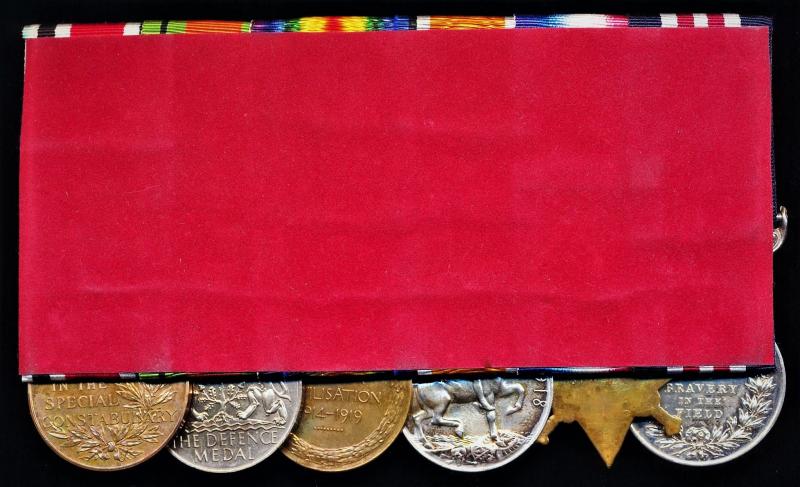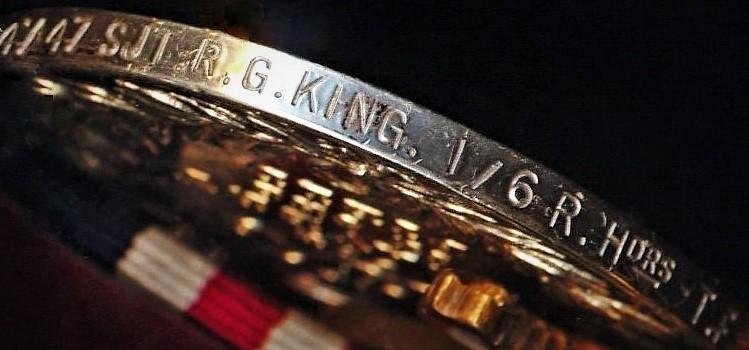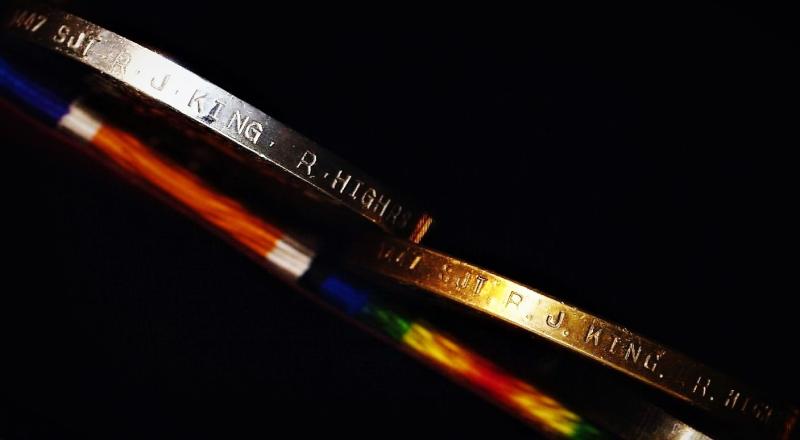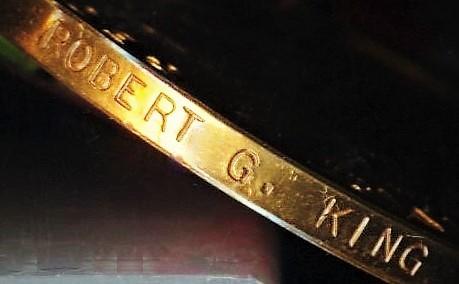A confirmed 51 Highland Division 'Beaumont Hamel' Military Medal, World Wars & Police Long Service Medal group of 6: Sergeant Robert George King, 1/6th Battalion Royal Highlanders (Black Watch) Territorial Force, later Special Constabulary
- Military Medal. GV 1st type (1447 Sjt: R. G. King. 1/6 R. Hdrs-T.F.)
- 1914-15 Star (1447 L-Cpl R. J. King. R. Highrs.)
- British War Medal. Silver issue (1447 Sjt R. J. King. R. Highrs.)
- Interallied Victory Medal (1447 Sjt R. J. King. R. Highrs.)
- Defence Medal
- Special Constabulary Long Service Medal. GVI 1st type (Robert. G. King)
For Bravery in the Field at 'Beaumont Hamel'. The Military Medal award was published in the London Gazette issue of, and is confirmed as a gallantry award for the recipients conspicuous bravery at the capture of 'Beaumont Hamel' by 51st Highland Division, during the Battle of the Somme. The local Perthshire newspapers The Strathearn Herald issues of 27 January 1917, and 3 March 1917, respectively contained the below following articles pertaining to Robert King, as quoted below:
Quote,
MILITARY MEDAL FOR BLACKFORD SOLDIER
Intimation has been received that Sergent Robert G. King, Blackford, son of Mr. John King, Cross Cottage, Stirling Street, Blackford, has been awarded the Military Medal for conspicuous bravery in the field. Sergeant King, who is the first of the Blackford lads to gain this distinction, had been connected with the Territorials for some years, and was mobilised on the outbreak of war. He crossed to France with his regiment early in 1915, and was invalided home some months later, returning to France for the second time some months ago. He is at present in an English hospital suffering from trench feet. Previous to the war he was in the employment of Messers Taylor and Dougall, Strathallan Boot Factory.
Unquote.
Quote,
SOLDIERS At HOME:- Sergeant Robert G. King, Black Watch, is at present home on furlough from Chester Hospital, England, where he has been for the past three months, suffering from trench feet. Private John Morrison, Black Watch, arrived home on Wednesday, of last week from, Dalmeny Hospital, Edinburgh, where he has been for four months, suffering from a contused back. Both were members of the local Territorials, mobilized at the outbreak of war, and have been engaged in much of the heavy fighting on the Western Front. Sergeant King took part in the magnificent assault on Beaumont Hamel, for which he was awarded the Military Medal, and Private Morrison was present at the brilliant engagement at Le Sars on the Somme.
Unquote.
King Family History: See the Strathearn Herald issue of 14 June 1919, which has a lengthy article pertaining to the Golden Wedding and family history pertaining to Sergeant King's parents and family
Capture of Capture of Beaumont-Hamel: Was a tactical incident that took place during the Battle of the Somme (1 July – 18 November 1916) in the Battle of the Ancre (13–18 November) during the second British attempt to take the village. Beaumont-Hamel is a commune in the Somme department of Picardy in northern France. The village had been attacked on 1 July, the First Day of the Somme. The German 2nd Army (General Fritz von Below) defeated the attack, inflicting many British and Newfoundland Regiment casualties
On 1 July 1916, the 29th Division attacked at 7:20 a.m., ten minutes after a 40,000 lb (18 long tons; 18 t) mine under the Hawthorn Ridge Redoubt had been blown. The explosion alerted the Germans nearby, who occupied the far lip of the crater and pinned down British troops in no man's land on either side, where they were caught by German artillery-fire. White German signal rockets were mistaken for success flares and the 88th Brigade, including the Newfoundland Regiment, advanced from 200 yd (180 m) behind the British front line. The few parties that crossed no man's land found uncut wire. Reserve Infantry Regiment 119 had been in deep dugouts (Stollen) and emerged to defeat the attack. The Newfoundlanders suffered 710 casualties, of the 29th Division total of 5,240 casualties
By early November, the British in the south were ready to attack northwards towards the Ancre river, simultaneous with an attack eastwards on the north side of the river to capture Beaumont-Hamel and Serre-lès-Puisieux. On 13 November, during the Battle of the Ancre in thick fog, the 51st (Highland) Division outflanked Beaumont-Hamel on both sides and forced the garrison to surrender. Infantry and artillery co-operation was conspicuously superior to 1 July; barrages were better aimed and more destructive, cut off the German front line from the rear and neutralised German guns; mopping up parties had been given specific objectives in the German defences. The defenders were exhausted before the battle began and where the British artillery had cut the wire, were unable to repulse the attack. The defenders of Beaumont-Hamel repulsed a frontal attack by the Highlanders but were surrounded in the fog and surrendered later in the day
Medals & clasp(s) verification: The MM and Great War medals all verified as entitled per the below cited sources:
- Military Medal: Published in Supplement to The London Gazette issue 22 January 1917
- 1914-15 Star: WO 329/2741
- British War Medal: WO 329/1357 (records both his regimental numbers vis 1447 & later 265228)
- Interallied Victory Medal: WO 329/1357 (records both his regimental numbers vis 1447 & later 265228)
Note: Recipients MIC and all 3 x Great War medal rolls all show the same single letter typo Robert 'J'. King (sic). This being exactly as the medals were subseqiently issued, and never returned for correction
Robert George King, son of John King, was a native of Blackford, near Crieff, Perthshire, Scotland, where he was born circa 1881. Robert had nine siblings, comprising 4 x brothers (all five of them served during the Great War - and all survived) and 5 x sisters. On the outbreak of the Great War, Robert, a existing member of the Territorial Force, was mobilized for service with his battalion 6th (Perthshire) Battalion Royal Highlanders (Black Watch). His Medal Index Card and corresponding medal roll for the 1914-15 Star, show that he first entered theatre of war 'France' on, 2 May 1915, disembarking with 6/Royal Highlanders at the channel port of Boulogne. At the time of his landing in France, he held the appointment rank of Lance-Corporal. Robert was decorated with the Military Medal 'For Bravery in the Field' at Beaumont Hamel during the Battle of the Somme, and in 1917, was invalided back to England suffering with Trench Feet. After recovery and recuperation Sergeant King was returned to France. While Sergeant King appears to have avoided German gunshot and shrapnel wounds during his overseas service in France, he was lucky with his fortune while carousing when out of the front line, as he is later recorded on 23 March 1918, being admitted to the 58th Casualty Clearing Station seeking treatment, for 'VDG' (Gonorrhoea), subsequently being sent to No. 4 Stationary Hospital from where he was transferred on 17 April 1918 (file series MH 106/1483 refers). The highest rank Robert held during his service in France with the British Expeditionary Force was Sergeant. He survived the horrors of the Great War, and was disembodied from the British Army on, 23 February 1919
The medals neatly mounted in the court-style on a flock covered board, for display purposes
A fine Great War medal group to a 'Jock' NCO who is confirmed as having been decorated for bravery in the field with the 51st Highland Division at the capture of 'Beaumont Hamel'
Condition: Mostly GVF
Code: 22808







